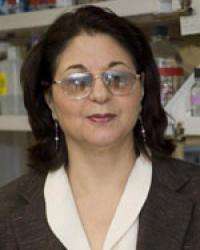Multiple sclerosis drug may one day treat colorectal cancer

After uncovering a mechanism that promotes chronic intestinal inflammation and the development of colorectal cancer, scientists from Virginia Commonwealth University Massey Cancer Center have found that fingolimod, a drug currently approved for the treatment of multiple sclerosis, could potentially eliminate or reduce the progression of colitis-associated cancer (CAC).
The study, published online in the journal Cancer Cell, was led by Sarah Spiegel, Ph.D., Mann T. and Sara D. Lowry Chair in Oncology, co-leader of the Cancer Cell Signaling program at VCU Massey Cancer Center and chair of the Biochemistry and Molecular Biology Department at the VCU School of Medicine. Spiegel's team discovered that increased production of an enzyme known as sphingosine kinase 1 (SphK1) causes cells lining the intestine to produce more of a signaling molecule known as sphingosine-1-phosphate (S1P), which activates a variety of biological mechanisms that lead to chronic intestinal inflammation and the development and progression of CAC. The researchers then used animal models to demonstrate that the drug fingolimod decreased expression of SphK1 and S1P's receptor, S1PR1, which subsequently interfered with the development and progression of CAC, even after tumors were established.
"Perhaps the most significant aspect of this study is the therapeutic potential of fingolimod in the treatment of colitis-associated cancer," says Spiegel. "Since this drug is already approved for clinical use, we're hoping to initiate a clinical trial to study its efficacy in patients with CAC in combination with approved therapies."
Essentially, the researchers discovered a self-feeding loop that results in chronic intestinal inflammation and increases the progression of CAC. The team showed that increased production of SphK1 and S1P lead to sustained activation of NF-kB and Stat3, which are both proteins called transcription factors that control the way DNA is transcribed in a cell's nucleus in order to respond to environmental stimuli. This increased activation of NF-kB and Stat3 led to an increased production of TNF-a and IL-6, which are small pro-inflammatory molecules secreted by immune system cells. The increased inflammation, in turn, led to increased production of SphK1 and S1P, which continued the malicious cycle.
This is the first time that SphK1 and S1P have been linked to NF-kB, Stat3, chronic inflammation and CAC.
"Because one of the consequences of inflammatory bowel diseases is an increased risk of developing colorectal cancer, the next step in our research is to examine blood samples from patients with irritable bowel syndrome and colitis-associated cancer to measure levels of S1P," says Spiegel. "Colorectal cancer is one of the leading causes of cancer-related deaths, and we're hopeful that this research will lead to more effective treatments."
More information: www.sciencedirect.com/science/ … ii/S1535610812004928














